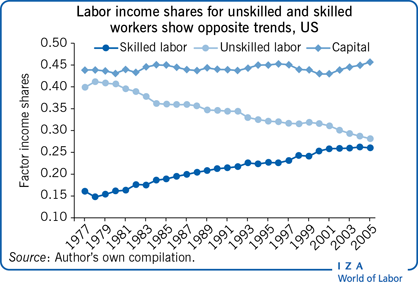Elevator pitch
Globally, the share of income going to labor (the “labor income share”) is declining. However, this aggregate decline hides more than it reveals. While the labor income share has decreased for low-skilled workers, this has been concurrent with an increase for high-skilled workers. Globalization leading to a growing skill premium and an increasing complementarity between capital and skill through the advancement of technology explains the polarization of labor income shares across the skill spectrum.

Key findings
Pros
A decline in the labor income share suggests growing disparity in personal incomes.
An increasing capital–labor ratio lowers the labor income share when capital and labor are substitutes.
The labor income share for high-skilled workers has increased over the past few decades.
Globalization can improve the labor income share.
Cons
The unequal distribution of personal income from non-labor sources could undermine the relationship between labor income shares and personal income.
Most studies show capital and labor as complements, which suggests an increase in the labor income share with increasing capital–labor ratio.
The labor income share for low-skilled workers has declined over the past few decades.
Shifts in income shares between industries and increased product market concentration caused by globalization can decrease the labor income share.